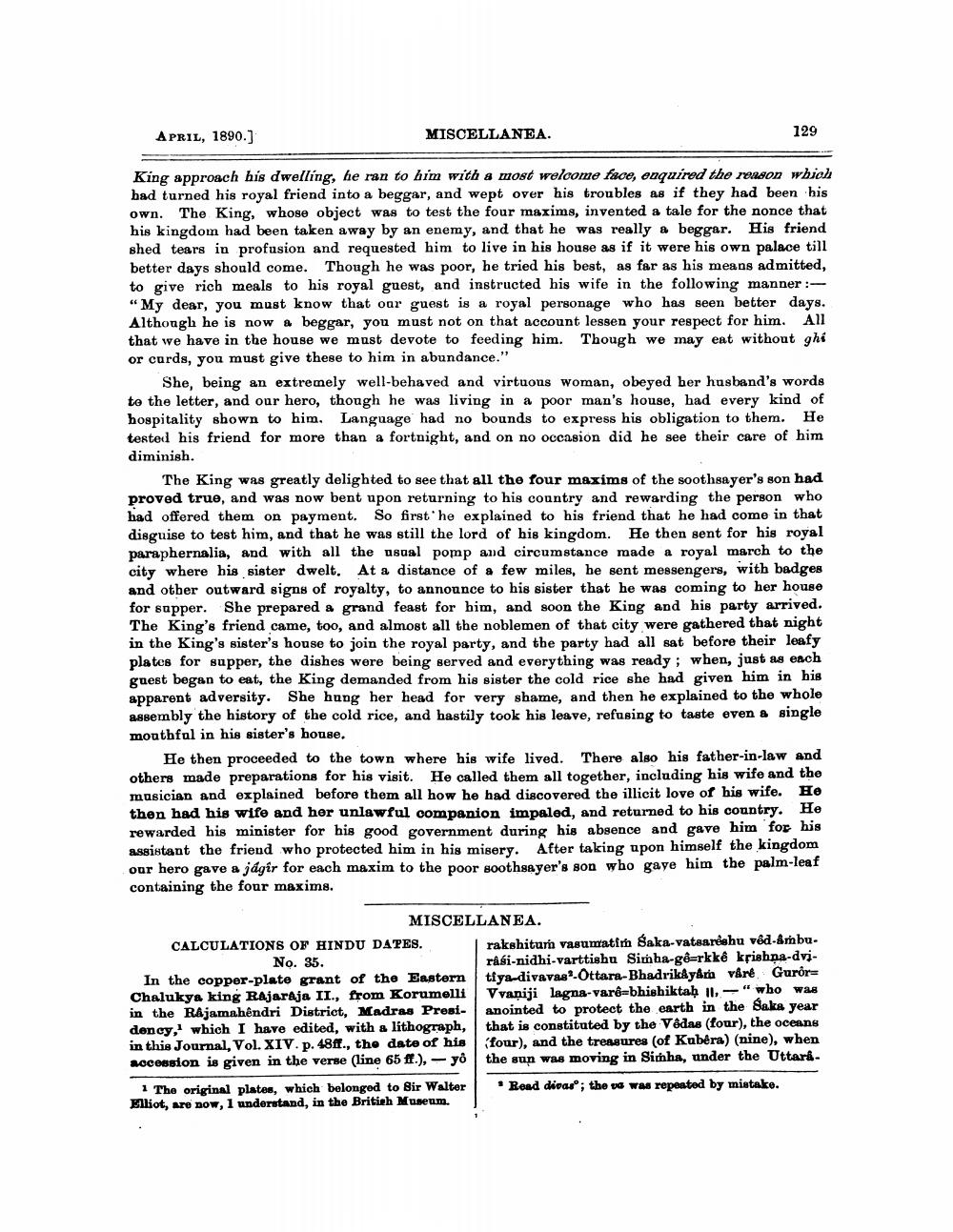________________
APRIL, 1890.]
MISCELLANEA.
King approach his dwelling, he ran to him with a most welcome face, enquired the reason which had turned his royal friend into a beggar, and wept over his troubles as if they had been his own. The King, whose object was to test the four maxims, invented a tale for the nonce that his kingdom had been taken away by an enemy, and that he was really a beggar. His friend shed tears in profusion and requested him to live in his house as if it were his own palace till better days should come. Though he was poor, he tried his best, as far as his means admitted, to give rich meals to his royal guest, and instructed his wife in the following manner :"My dear, you must know that our guest is a royal personage who has seen better days. Although he is now a beggar, you must not on that account lessen your respect for him. All that we have in the house we must devote to feeding him. Though we may eat without ghi or curds, you must give these to him in abundance."
She, being an extremely well-behaved and virtuous woman, obeyed her husband's words to the letter, and our hero, though he was living in a poor man's house, had every kind of hospitality shown to him. Language had no bounds to express his obligation to them. He tested his friend for more than a fortnight, and on no occasion did he see their care of him
diminish.
129
The King was greatly delighted to see that all the four maxims of the soothsayer's son had proved true, and was now bent upon returning to his country and rewarding the person who had offered them on payment. So first he explained to his friend that he had come in that disguise to test him, and that he was still the lord of his kingdom. He then sent for his royal paraphernalia, and with all the usual pomp and circumstance made a royal march to the city where his sister dwelt. At a distance of a few miles, he sent messengers, with badges and other outward signs of royalty, to announce to his sister that he was coming to her house for supper. She prepared a grand feast for him, and soon the King and his party arrived. The King's friend came, too, and almost all the noblemen of that city were gathered that night in the King's sister's house to join the royal party, and the party had all sat before their leafy plates for supper, the dishes were being served and everything was ready; when, just as each guest began to eat, the King demanded from his sister the cold rice she had given him in his apparent adversity. She hung her head for very shame, and then he explained to the whole assembly the history of the cold rice, and hastily took his leave, refusing to taste even a single mouthful in his sister's house.
He then proceeded to the town where his wife lived. There also his father-in-law and others made preparations for his visit. He called them all together, including his wife and the musician and explained before them all how he had discovered the illicit love of his wife. He then had his wife and her unlawful companion impaled, and returned to his country. He rewarded his minister for his good government during his absence and gave him for his assistant the friend who protected him in his misery. After taking upon himself the kingdom our hero gave a jágir for each maxim to the poor soothsayer's son who gave him the palm-leaf containing the four maxims.
MISCELLANEA.
CALCULATIONS OF HINDU DATES. No. 35.
In the copper-plate grant of the Eastern Chalukya king Rajaraja II., from Korumelli in the Rajamahêndri District, Madras Presidency, which I have edited, with a lithograph, in this Journal, Vol. XIV. p. 48ff., the date of his accession is given in the verse (line 65 ff.), yo
1 The original plates, which belonged to Sir Walter Elliot, are now, I understand, in the British Museum.
rakshitum vasumatim Saka-vatsaréshu vêd-âmburasi-nidhi-varttishu Simha-gê-rkké krishna-dvitiya-divavas-Ottara-Bhadrikåyår våré Guror= Vvaniji lagna-varê-bhishiktaḥ 11, -"who was anointed to protect the earth in the Saka year that is constituted by the Vêdas (four), the oceans (four), and the treasures (of Kubera) (nine), when the sun was moving in Simha, under the Uttar
*Read divas"; the va was repeated by mistake.




